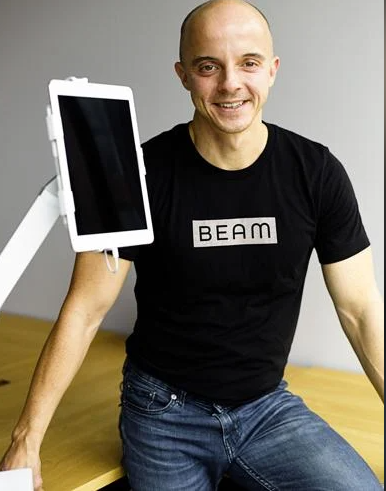Freestone Medical Center Welcomes Tele Health Partners, Beam Healthcare
Freestone and Leon County patients will soon have another reason to stay close to home for their health care, rather than being transferred to hospitals in Waco, Tyler, Dallas or Houston.

Dr. Roswell Quinn of Beam Healthcare poses by one of the iPads being used at Refugio County Memorial Hospital to provide patients with telemedicine services. (Contributed photo)
On July 1, 2024, Freestone Medical Center will launch a new telehealth program designed to provide several new clinical services for Inpatient Care, like Hospitalist, Cardiologists (heart), Endocrinologists (hormones), Nephrologist (kidneys), Pulmonologist (lungs), Neurologist (nerves and brain), etc. The program is aimed at reducing the transfer of patients to specialists outside of Freestone County.
“For the past seven years, we have worked hard to develop a face to face, in person, and high touch experience to our patients. More recently, we have trying to figure out how to leverage technology to better serve our patients in a cost-effective manner,” explained Nicki Hagen, Chief Nursing Officer at Freestone Medical Center. “In September of 2023, I happened to run into providers from Beam Healthcare and once I discovered their healthcare goals aligned with ours, negotiations began.”
Dr. Sarjoo Patel, Owner, Founder, and CEO of Beam Healthcare said the most important part of patient care is the interview. “Telemedicine is still 95% medicine. It all starts with giving the patient time and attention to hear their medical history,” he said.
“Patients can receive high level care in the hospital 24/7 with new telemedicine technology,” continued Dr. Patel. “They will be able to speak with the physician via video on an iPad and providers will be able to remotely listen to heart-lung sounds and other routine vital signs with the assistance of the onsite nurse.”
The remote device has a wireless otoscope (ears), stethoscope (heart), O2 reader (oxygen), blood pressure cuff, tongue depressor, and digital camera so that the nurse on site can provide the patient’s vitals to the doctor virtually.
“From here, our telemedicine providers are able to remotely listen to a patient’s heart, lungs, and abdomen with a digital stethoscope, and evaluate skin, ear, and throat with a digital camera,” explained Patel. “We can then put the whole picture together with the patient’s interview, their virtual exam, and by reviewing their labs, images, and other notes. The only thing I am not able to do is put my finger on the patient but otherwise the whole process and the level of care is the same as us being there in person.”
He continued, saying “With the 24/7 tele-hospitalist program, Freestone Medical Center will be able to keep acutely sick patients locally in the hospital and avoid unnecessary transfers to outside institutions. Patients are now able to receive high-quality care in their community and stay close to their family and friends.”
Beam Healthcare, based in Madison, Wisconsin, has been providing telemedicine services in hospital and clinic settings since 2014. They have been taking care of patients in medical and intensive care units for many years. Its telemedicine programs are also accredited by The Joint Commission, a quality assurance organization.
Patel graduated from medical school in 2011 and immediately saw rural hospitals struggling to meet their patients’ healthcare needs. “I just saw that smaller hospitals were losing so many patients because of their lack of providers,” Patel said. “I wanted to help rural hospitals find a way to take care of these complex patients instead of sending them off for non-procedural reasons.”
He also said that hiring onsite physicians in rural areas is difficult and cost prohibitive. High-quality telemedicine programs will help bridge this gap and make healthcare much more convenient for Freestone Medical’s residents.
“Some families can’t take time off from work to take an elderly family member to an out-of-town hospital,” Patel said. “Then there are high gas prices, wait time, travel time. You travel up to two hours or more for a 15-minute visit.”
John Yeary, CEO of Freestone Medical Center, said his hospital’s patients have routinely pleaded to stay in Fairfield.
“They would be transferred to other facilities to attain inpatient specialist care that their condition necessitated,” Yeary stated. “This has always been very scary for patients and their families. With the new telemedicine platform, patients can get the care they need, right here at home, provided by caring staff whom they know and trust. All this is without putting undue burden on patients and family members in an impersonal hospital and potentially costing untold amounts of money for gas and hotel accommodations to stay with their loved ones.”
It is important to note that the change only effects Inpatient Care at the Hospital. It does not apply to the Emergency Room or the Clinic.
As to how this new service will work with billing, Chief Nursing Officer Hagen shared that the new hospitalists are working to get in network with payers. “As with all contractors, there will be a combination of in and out of network claims in the beginning but there should not be a difference in the way we currently bill or the way the patient is billed,” she said.




